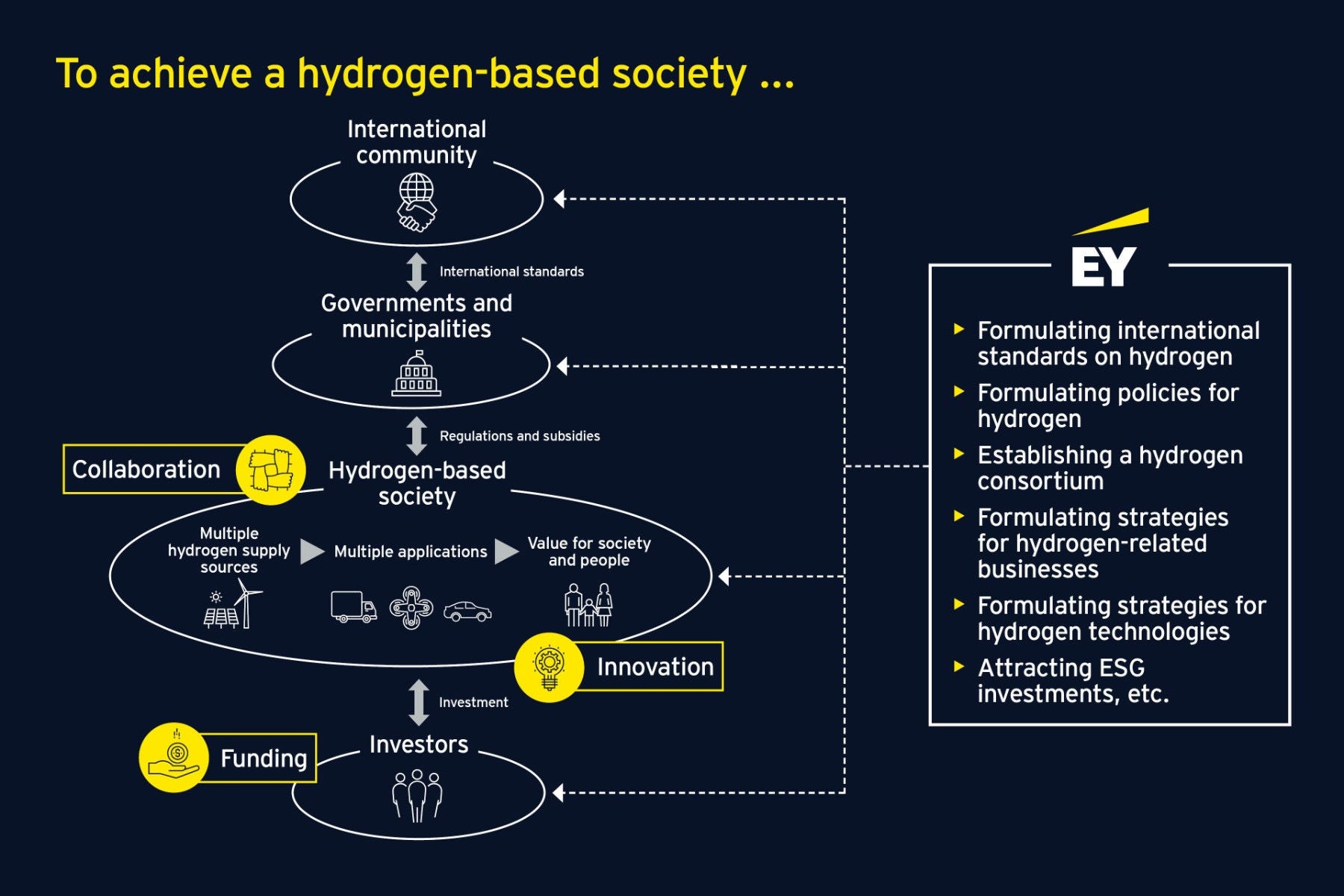EY refers to the global organization, and may refer to one or more, of the member firms of Ernst & Young Global Limited, each of which is a separate legal entity. Ernst & Young Global Limited, a UK company limited by guarantee, does not provide services to clients.

Hydrogen energy is generally considered to be one of most effective solutions for achieving a sustainable society. Is there potential for it to be widely adopted in Japan?
Mass production of fuel-cell vehicles (FCVs) in Japan began in 2015, in what is known as “Year 1 for hydrogen energy.”
Since then, hydrogen supply networks have been growing steadily, with 110 hydrogen fueling stations operating across Japan (as of November 2019*1). Japan is also making progress with the introduction of non-FCV hydrogen-based applications, such as fuel-cell buses and high-purity hydrogen fuel cells.
However, hydrogen energy is still very much a niche technology in the mobility and energy sectors. Only about 3,000 FCVs have been sold in Japan (as of 2018*2), just 0.005% of the 62 million cars owned by Japanese households (as of July 2019*3). Compared with 30,000 petrol stations nationwide (as of 2018*4), there were just 110 hydrogen fueling stations in the country, a mere 0.4% of the total. Hydrogen energy consumption in Japan, some 32 tera-joules (TJ*5), makes up just 0.0003% of the nation’s total energy usage, which stands at 11 million TJ*6.
If hydrogen is to emerge as a major energy source, Japan needs to continuously promote its benefits and accelerate its adoption. Does hydrogen energy have the potential to be widely accepted by Japanese society over time?
Chapter 1
Initiatives for achieving a hydrogen-based society
Thanks to support from the Japanese government, the country is making steady progress towards creating a hydrogen-based society.
The Japanese government has taken the lead with initiatives for creating a hydrogen-based society. It implemented the 4th Basic Energy Plan*7 in April 2014 in which it committed to promoting hydrogen energy, which was followed by the creation of the Strategic Road Map for Hydrogen Energy and Fuel Cells*8 in June of the same year. In December 2017, the government released its hydrogen energy-specific national strategy called “Hydrogen Energy Basic Strategy”*9 to promote activities for achieving a hydrogen-based society. Japanese government ministries and agencies, mainly the Ministry of Economy, Trade and Industry (METI) and the Ministry of the Environment, have earmarked an annual spend of up to ¥10 billion (US$93 million)*10 for activities related to promoting hydrogen energy. This budget goes to support the practical application of hydrogen-based technologies, the promotion of hydrogen energy and fuel cells, and the development of hydrogen fueling stations. The government has set a target for boosting the number of hydrogen fueling stations to 320*11 by 2025, from around 110 currently.
Chapter 2
How does hydrogen contribute to society?
Hydrogen is an effective solution for achieving a sustainable society
Why push forward with efforts to create a hydrogen-based society? The reason is that hydrogen is considered an effective solution for achieving a sustainable society.
Creating a low-carbon society
A low-carbon society is possible via the use of hydrogen. Since the Paris Agreement was adopted in late December 2015 at the Paris Climate Conference (COP 21) *12 , governments around the world have been accelerating their commitment to combating climate change. The use of renewable energy is indispensable to prevent climate change, and the Japanese government is aiming for renewable energy to account for between 22% and 24%*13 of the country’s energy mix by 2030.
However, there are challenges in ensuring the broad adoption of renewable energy. Renewable energy sources, such as solar and wind power, are not sufficiently reliable with power output dependent on various conditions, such as time of day. Production of renewable energy is also uneven, meaning there may be a regional mismatch between demand and supply.
Hydrogen produced via the electrolysis of water can be used in a fuel cell or turbine to produce electricity. This hydrogen, produced as a secondary energy source, is therefore both transportable and storable. If a hydrogen distribution system can be established in society, it would solve some of the challenges such as renewable energy’s lack of reliability and geographical concentration.
Lowering dependency on overseas energy sources
The wide scale adoption of hydrogen would also help to reduce reliance on imported energy sources. Currently, Japan must import a significant portion of its energy with approximately 90%*14 coming from imported fossil fuels. Such energy import dependency is both costly and and a security risk. If hydrogen production from multiple energy sources, including renewables, were increased, the country’s dependence on imported fossil fuels would decrease.
Creating a resilient society
The use of hydrogen could also contribute to developing a more resilient society. Besides being prone to earthquakes, Japan has also recently been impacted by strong typhoons and heavy rains, such as the West Japan Heavy Rain Disaster in 2018, and Typhoons Faxai and Hagibis in 2019, with ever-increasing severity thought to be related to climate change*15. Electricity is indispensable to support people’s lives in disaster-affected areas. If the use of hydrogen energy was more widespread in society, power shortages in the event of disaster could be alleviated: for example, one FCV and FC bus, with a full tank, can supply households and cities with 120 kilowatt hours and 455 kilowatt-hours*16 of electricity, respectively.
Chapter 3
Towards a hydrogen-based society
Innovation, collaboration, and funding
Hydrogen energy is widely considered to be one of the most effective solutions for achieving a sustainable society, but it will not be easy for Japan to make this shift. There are major obstacles: Japan has already established an energy distribution system that is economical, safe and convenient; there is no coordination between those groups likely to see the immediate benefits of large-scale hydrogen adoption; and it will take time to revamp the underlying energy infrastructure to develop hydrogen energy supply chains.
EY believes that innovation, collaboration, and funding are crucial factors to creating a hydrogen-based society
Innovation: Maximizing the value of hydrogen energy creates benefits for everyone
Japan has already developed an energy distribution system that is economical, safe and convenient. For hydrogen energy to be widely accepted, technological innovaions and business model transformations are encessary to give hydrogen a competitive advantage. In addition, new ways of thinking are needed to drive the adoption of hydrogen energy. For example, drones powered by fuel-cells have a longer flying range than those powered by lithium ion batteries (LiB)*17 while fuel-cell powered forklifts unlike electric versions do not require battery changes, saving time and storage space. Once the public is aware of the value and benefits, it will be easier to speed up the creation of hydrogen-based society.
Collaboration: Building a value chain and promoting collaboration of national and local governments
Generate, store, transmit and utilize hydrogen energy: to build this robust value chain, people from a wide range of sectors must work together. The benefits of hydrogen energy for society are numerous. Beneficiaries include not only end-users but also national and local government. The advantages of hydrogen energy —carbon reduction, BCP, and innovation— need to be understood collectively in order to set prices appropriately, collect revenue, and redistribute it to stakeholders across the value chain.
There needs to be an ecosystem based on new business models that enable this complex exchange of value to be more widely understood.
Funding: Sustaining businesses that spur social change over a span of several decades
Restructuring Japan’s energy infrastructure and establishing a hydrogen energy supply chain will take several decades. For most private entities, this timeframe goes beyond what they usually consider when making capital investment decisions. In particular, there is always a risk that funding will dry up, and that a project might be shelved. On the other hand, sustainable investing has been on an upswing. According to some analysts, assets under management by sustainable investment funds exceeded ¥3,000 trillion ($28 trillion) in 2018*18. Such investors are expected to play a key role in supporting the development of a hydrogen-based society from a long-term perspective, while sharing a common goal and vision of how society will be transformed through the use of hydrogen energy, as well as the creation of shared value.

References in Japanese
- Next Generation Vehicle Promotion Center(http://www.cev-pc.or.jp/suiso_station/)
- Next Generation Vehicle Promotion Center(http://www.cev-pc.or.jp/tokei/hanbai.html)
- Automobile Inspection & Registration Information Association(https://www.airia.or.jp/publish/statistics/number.html)
- Agency for Natural Resources and Energy(https://www.enecho.meti.go.jp/category/resources_and_fuel/distribution/hinnkakuhou/190723a.html)
- Figures based on EY data
- Agency for Natural Resources and Energy(https://www.enecho.meti.go.jp/statistics/total_energy/results.html)
- Ministry of Economy, Trade and Industry(https://www.enecho.meti.go.jp/category/others/basic_plan/pdf/140411.pdf)
- Ministry of Economy, Trade and Industry(https://www.meti.go.jp/committee/kenkyukai/energy/suiso_nenryodenchi/report_001.html)
- Ministry of Economy, Trade and Industry(https://www.meti.go.jp/press/2017/12/20171226002/20171226002.html)
- EY survey
- Ministry of Economy, Trade and Industry(https://www.meti.go.jp/press/2018/03/20190312001/20190312001-1.pdf)
- Agency for Natural Resources and Energy(https://www.enecho.meti.go.jp/about/special/tokushu/ondankashoene/pariskyotei.html)
- Ministry of Foreign Affairs of Japan(https://www.mofa.go.jp/mofaj/files/000090897.pdf)
- Agency for Natural Resources and Energy(https://www.enecho.meti.go.jp/about/special/johoteikyo/energyissue2019.html)
- Article by Japan Agency For Marine-Earth Science and Technology(https://gendai.ismedia.jp/articles/-/54553?page=2)
- Agency for Natural Resources and Energy(https://www.meti.go.jp/committee/kenkyukai/energy/suiso_nenryodenchi/suiso_nenryodenchi_wg/pdf/003_02_00.pdf)
- Article on fuel cell drone(https://www.drone.jp/special/20190517172817.html)
- 2018 Global Sustainable Investment Review *English available(http://www.gsi-alliance.org/wp-content/uploads/2019/03/GSIR_Review2018.3.28.pdf)
Building a better working world
At EY, we believe hydrogen energy is one means of building a better working world. We are supporting the development of international standards and policies related to hydrogen energy. In addition, we are promoting various activities to contribute to building an ecosystem that combines innovation, collaboration and funding to create a hydrogen-based society.
Summary
In Japan, mass production of FCVs began in 2015, known as “Year 1 for hydrogen energy.” Since then, Japan’s hydrogen supply networks have been steadily evolving. However, hydrogen energy is still very much considered a niche technology in the mobility and energy sectors. If hydrogen energy is to become a primary energy source, we must continuously support the promotion and shift to a hydrogen-based society.


